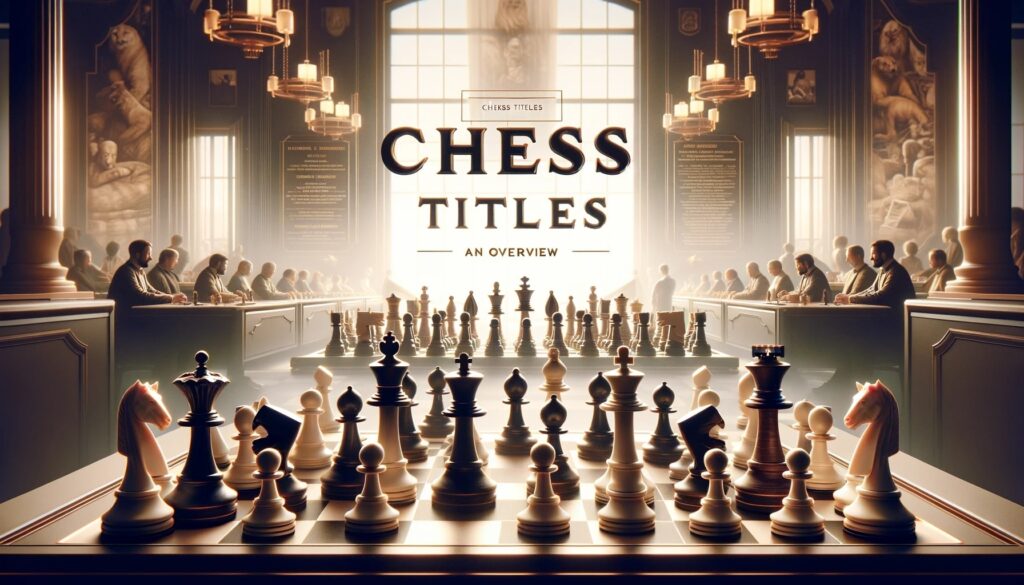Chess Titles: An Overview
January 26, 2024
Chess, a blend of art, science, and sport, boasts a variety of professional titles that signify different levels of mastery. Awarded by the World Chess Federation (FIDE), these titles are internationally recognized.

Chess Titles
Main Chess Titles
Grandmaster (GM): The pinnacle of chess titles. Requires a FIDE rating of at least 2500 and achieving three grandmaster norms.
International Master (IM): A prestigious title, just below GM. Necessitates a rating of at least 2400 and three IM norms.
FIDE Master (FM): Attainable with a 2300 rating, sans norm requirements.
Candidate Master (CM): An entry-level title for players reaching a 2200 rating.
Specialized Titles
Woman Grandmaster (WGM): The highest female chess title, similar to the GM but with slightly lower rating and norm requirements.
Woman International Master (WIM): Comparable to the male IM, but with lower requirements.
Titles for Chess Coaches, Arbiters, and Organizers
In addition to player titles, the World Chess Federation (FIDE) also recognizes the roles of those who contribute to the sport outside of direct competition. These include chess coaches, arbiters (officials), and tournament organizers, each playing a vital role in the development, regulation, and successful execution of chess events and training.
Titles for Chess Coaches:
- FIDE Trainer Titles: This category includes several levels, such as FIDE Instructor, FIDE Trainer, and FIDE Senior Trainer. These titles are crucial for those looking to professionally coach at various levels, from local clubs to national teams. They validate the coach’s expertise in teaching chess strategy, tactics, and theory. To earn these titles, a coach must meet certain criteria, including holding training seminars, producing successful students, and possessing a deep understanding of chess pedagogy.
Titles for Chess Arbiters:
- FIDE Arbiter (FA) and International Arbiter (IA): Arbiters are essentially the referees of the chess world. They ensure fair play and adherence to chess rules during tournaments. The FA and IA titles require a comprehensive understanding of chess rules, successful oversight of a number of chess matches and tournaments, and participation in arbiter workshops and seminars. International Arbiters are often seen officiating high-level competitions and are responsible for making critical decisions that can impact the outcomes of important matches.
Titles for Chess Organizers:
- FIDE National Organizer and International Organizer: These titles are awarded to individuals who demonstrate exceptional skills in organizing chess events. A FIDE National Organizer focuses on regional and national events, while an International Organizer is involved in managing major international tournaments. Criteria for these titles include organizing successful tournaments, demonstrating logistical and management skills, and understanding international chess regulations and standards.
Each of these roles and their corresponding titles are essential for the smooth operation and growth of the chess community. They not only contribute to the organization of events but also play a pivotal role in nurturing new talent, maintaining the integrity of the game, and expanding the reach of chess across the globe. The recognition of these roles through official titles by FIDE underscores the importance of a holistic approach to the game, encompassing not just the players but all contributors to the chess ecosystem.
Historical and Evolutionary Aspects
The inception and progression of chess titles since 1950 reflect the game’s rich history and evolving standards, contributing to its global stature.
Criteria for Awarding Titles
The criteria for awarding these titles go beyond chess ratings, involving performance against existing title holders and achieving specific results, ensuring that the titles reflect true skill and ability.
Conclusion
Chess titles are not mere accolades; they embody dedication, expertise, and profound understanding of chess. Their historical significance and ongoing relevance continue to endow the chess community with a sense of purpose and direction, inspiring players worldwide to reach new heights of excellence in this intellectually demanding game
